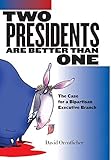Two Presidents Are Better Than One : The Case for a Bipartisan Executive Branch / David Orentlicher.
Material type: TextPublisher: New York, NY : New York University Press, [2013]Copyright date: ©2013Description: 1 online resourceContent type:
TextPublisher: New York, NY : New York University Press, [2013]Copyright date: ©2013Description: 1 online resourceContent type: - 9780814789490
- 9780814724682
- 352.230973 23
- JK516 .O75 2013
- online - DeGruyter
| Item type | Current library | Call number | URL | Status | Notes | Barcode | |
|---|---|---|---|---|---|---|---|
 eBook
eBook
|
Biblioteca "Angelicum" Pont. Univ. S.Tommaso d'Aquino Nuvola online | online - DeGruyter (Browse shelf(Opens below)) | Online access | Not for loan (Accesso limitato) | Accesso per gli utenti autorizzati / Access for authorized users | (dgr)9780814724682 |
Frontmatter -- Contents -- Preface -- 1. Introduction -- 2. A two-person, bipartisan executive -- 3. The problem of the imperial presidency -- 4. The problem of partisan conflict -- 5. A bipartisan executive and presidential decision making -- 6. Representation for the public in Washington -- 7. The prospects for adopting a two-person presidency -- 8. Conclusion -- Notes -- Bibliography -- Index -- About the Author
restricted access online access with authorization star
http://purl.org/coar/access_right/c_16ec
“Many Americans are unsatisfied with politics. Simultaneously, we are hesitant to question the basic soundness of our constitutional system. In this refreshingly provocative book, David Orentlicher explains why it is due time for us to reconsider dominant ideas about the presidency, now arguably our most powerful political institution. Challenging the conventional wisdom that the best executive is necessarily a unitary executive, Orentlicher makes a wonderful case for why ‘two presidents are better than one.’ Sure to be of interest to political scientists, legal scholars, as well as informed citizens justifiably worried about the fate of American democracy, this fascinating book dares to challenge everything you thought you knew about one of our favorite political institutions.”-William E. Scheuerman, Indiana University “Can Orentlicher be serious in calling for a plural executive? The answer is yes, and he presents thoughtful and challenging arguments responding to likely criticisms. Any readers who are other than completely complacent about the current state of American politics will have to admire Orentlicher’s distinctive audacity and to respond themselves to his well-argued points.”-Sanford Levinson, author of Framed: America’s 51 Constitutions and the Crisis of Governance When talking heads and political pundits make their “What’s Wrong with America” lists, two concerns invariably rise to the top: the growing presidential abuse of power and the toxic political atmosphere in Washington. In Two Presidents Are Better Than One, David Orentlicher shows how the “imperial presidency” and partisan conflict are largely the result of a deeper problem-the Constitution’s placement of a single president atop the executive branch. Accordingly, writes Orentlicher, we can fix our broken political system by replacing the one person, one-party presidency with a two-person, two-party executive branch. Orentlicher contends that our founding fathers did not anticipate the extent to which their checks and balances would fail to contain executive power and partisan discord. They also did not foresee how the imperial presidency would aggravate partisan conflict. As the stakes in presidential elections have grown ever higher since the New Deal, battles to capture the White House have greatly exacerbated partisan differences. Had the framers been able to predict the future, Orentlicher argues, they would have been far less enamored with the idea of a single leader at the head of the executive branch and far more receptive to the alternative proposals for a plural executive that they rejected. Like their counterparts in Europe, they might well have created an executive branch in which power is shared among multiple persons from multiple political parties. Analyzing the histories of other countries with a plural executive branch and past examples of bipartisan cooperation within Congress, Orentlicher shows us why and how to implement a two-person, two-party presidency. Ultimately, Two Presidents Are Better Than One demonstrates why we need constitutional reform to rebalance power between the executive and legislative branches and contain partisan conflict in Washington.
Mode of access: Internet via World Wide Web.
In English.
Description based on online resource; title from PDF title page (publisher's Web site, viewed 06. Mrz 2024)


